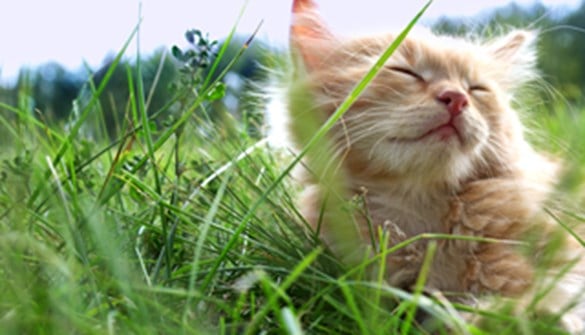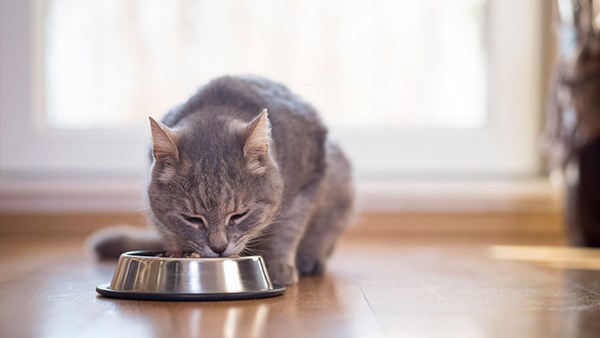Summer Advice For Cats
Summer is here and there’s some sun to be enjoyed. Summer days are ideal for cats who love to laze about in the heat.

Lazy Summer Days
Most cats love to lounge about in the sun, it’s the perfect time to stretch out and enjoy the heat. There are a few things that you need to be aware of to ensure your cat stays safe and well.
Garden watch-outs
Throughout the summer your cat will likely while away many days just moving around your garden from spot-to-spot. Make sure that you keep the garden as safe as possible.
Barbecue Season
It’s not summer without a barbecue or two, but all that food can prove tempting for cat’s, so don’t leave it unattended. Even when you’ve finished cooking a barbecue can stay hot for some time, make sure your cat doesn’t choose to explore anywhere near a hot barbecue.
If you are having people over, make sure that your cat has somewhere safe (and shaded, if outside) that they can hide if they’re not feeling very sociable.
Blue-Green Algae
Blue-green algae on lakes and ponds is widely reported, but did you know that this toxin also thrives in garden ponds, bird baths and water features?
Look out for bacterial ‘blooms’ on the water’s surface (clumps of greenish-brown flakes or scum with a pea soup consistency. Regularly refreshing any standing water sources in your garden during hot weather will stop bacteria from forming.
Exposure to blue-green algae is often fatal to pets and can cause long-term health problems if they do survive.
Paddling Pools
Many households set up a paddling pool or even swimming pools in the garden during hot weather. These pose a real risk to inquisitive cats; most of whom are not strong swimmers. Wherever possible you should try and empty your pool out when not in use or at the very least ensure you have a good, sturdy pool cover.
High-sided pools are a particular issue, if a cat falls in, they will struggle to climb out. It’s worth remembering that a simple pool cover may look like a solid surface that will look like a good resting spot.
Pesticides
Pesticides, fertilisers, weed killer and slug pellets can be highly toxic to cats, so it’s essential to use a pet-safe variety or make sure your cat doesn’t have access to areas where these are being used.
Bites, ticks and stings
How to prevent bee and wasp stings in cats
Cats can’t resist chasing after insects, wasps and bees they are abundant in the summer. While we’re aware of the risk of being stung, this isn’t the case for cats.
If your cat is victorious and catches a wasp or bee, they will most likely get stung. In most cases a sting will cause only minor pain and irritation. Don’t attempt to remove the sting with tweezers, this can actually squeeze more venom out. The best option is to scrape the stinger away with a piece of rigid card. Then to reduce the swelling, apply an ice pack wrapped in a towel to the area of the sting; this should also ease the pain.
In the event that your cat is stung multiple times, especially inside the mouth – this could cause a severe allergic reaction to the venom. If this happens, you should talk to your vet immediately.
Symptoms of an allergic reaction include:
- General weakness
- Breathing difficulties
- Excessive swelling
If you suspect that your cat is having an allergic reaction, contact your vet immediately, as the swelling can block their airways and quickly become serious.

Ticks
Ticks are most prevalent between May and October and tend to be found in grassy, wooded areas. If your cat enjoys exploring the world outside of your garden, then you should check them regularly for ticks.
If you do find one, don’t be tempted to try and remove it with tweezers. Ticks latch on very tightly and you may end up removing its body but leaving part of the mouth, which can cause infection and be very irritating for your cat. If a tick is removed within 24 hours, infection can be prevented. If you find a tick on your cat, contact your veterinary clinic.
To protect your cat, use an effective parasite treatment that kills ticks within two days. Your vet will be able to prescribe a suitable one for your cat. More information on ticks can be found here.
Hair balls and grooming
Cats moult more in the summer and it is estimated that they ingest around a third of the hair that they shed. This additional hair can lead to more hairballs, which can cause an upset stomach or a cough or issues with their throat.
Regular grooming to remove the additional fur before they get to it will help to prevent this and it will also help them to keep cooler.
Another benefit of regular grooming is that you can stay on top of the many leaves, grass seeds and natural debris that your cat will pick up on their travels. If these aren’t removed quickly, they can cause your cat’s fur to become matted and uncomfortable.
Keeping cool and protected
Whatever the temperature, it’s a good idea to ensure that your cat always has access to plenty of fresh water. Placing water bowls in various spots throughout the house and garden will pique their curiosity and hopefully encourage them to drink a bit more.
Cats are masters at finding shade, make sure that there are plenty of spots for them in your garden. You can easily make some more using an old box or other household items. Place a bowl of water nearby for a win-win.
Just like humans, cats can suffer from sunburn if they’re not properly protected. Breeds with short or white hair with pink ears are most at risk, so you need to be extra careful to protect them from the sun’s rays.
Apply a cat-friendly sun cream to sensitive areas of the body (nose, lips and tips of the ears), and try and keep them out of the sun during the hottest part of the day.
If the temperature rises
If we are lucky enough to see some higher temperatures over the coming weeks, there are some great tips here for keeping your cat cool and safe.
Enjoy the summer, stay safe - your vet is available if you need them

Cat Nutrition
Feeding your cat the right diet can help keep them healthy for years to come. Understanding how much to feed your cat plays a key role in maintaining a healthy weight.
Read article
